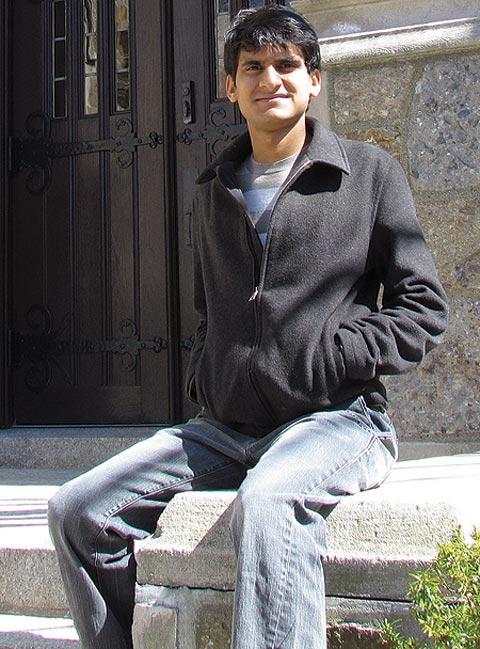 | « Back to article | Print this article |
He won a scholarship for his HIV activism in the US
In a four-part series commencing today, Arthur J Pais profiles the winners of the 2012 George Marshall Scholarships, a prestigious programme which finances up to forty young Americans annually to study for a degree in the United Kingdom.
First up in this series is Aditya Ashok, who aims to make the US healthcare system work for the largest number of Americans.
Paras S Minhas, Rahul Rekhi, Aditya Balasubrmanian and Aditya Ashok are among this year's 34 winners of the highly competitive George Marshall scholarships.
The scholarship allows United States students to pursue two years of graduate study in the United Kingdom.
Over 1,000 students across the US seek the scholarships each year, which are awarded to students of the highest academic ability based on their distinction in intellect and character, as evidenced by scholarly achievement, outstanding activities and leadership.
Past winners include the Pulitzer Prize-winning bestselling writer Thomas L Friedman, inventor Ray Dolby and Pulitzer Prize-winning economist Daniel Yergin.
Unlike the Rhodes Scholarship, which stipulates two years of graduate studies at Oxford, the Marshall Scholarship gives the freedom to choose any university across the UK, and offers full tuition for two years and a living stipend.
Ashok and Rekhi are both previous winners of the Truman Scholarship for outstanding public service.
"The Marshall Scholarship will provide me with an opportunity to better understand health disparities that exist between the US and the UK," Ashok, a recent history and biology graduate of Boston College, who will study global health at the University of Glasgow beginning August 2013, told The Boston College Chronicle.
"The Marshall Committee and my fellow Marshall Scholars are inspiring; I know I can learn so much from them, particularly by studying in Glasgow, which is infamous for health disparities that are replicated only in the US."
Ashok spurned acceptance at several Ivy League schools to study at Boston College because of its public service orientation.
He entered Boston College as a Presidential Scholar, one of the school's top honours which offers a full academic scholarship, plus special cultural and service learning opportunities.
"Without founders Professor of Theology and Presidential Scholars programme director Father James Keenan, and associate professor of history Virginia Reinburg, I would not have had an opportunity to win this award," Ashok told The Boston College Chronicle after winning the Truman Scholarship last year.
"They are titans in their respective fields, and inspiring mentors."
The Reverend Keenan has praised Ashok's zeal.
"Whether doing a research programme on stigma, finding effective ways of advancing needle exchange, or training people to assist teenagers with HIV–related issues, Adi is never a person who goes half-way." Keenan told The Boston College Chronicle.
Ashok credits experiences as a high-school student working in Ghana on an HIV-AIDS initiative, and later at a summer camp for HIV-positive individuals, as the catalysts for his passion.
He has forged ahead with his service projects despite personal losses.
His immigrant parents divorced when he was in high school, and his maternal grandparents in India were killed during a burglary.
"It was a tough time for him," JoAnne Principe, a guidance counsellor at Bishop Guertin High School in Nashua, Massachusetts, told The Boston Globe last year.
"I think that played a big role in his ability to be compassionate and empathetic to others."
Ashok has been enormously influenced by the example of his mother Sumathi Madhure and her father. He watched his mother staying up very late while studying for a graduate degree in physical therapy from UMass Lowell while she worked to bring up Ashok and his sister.
Ashok's maternal grandfather in India grew up an orphan and came to the United States to study engineering.
He was inspired by President John F Kennedy's appeal to young people to enter public service, Ashok has said, and returned to India to work as a civil engineer for the government.
Ashok is well known on the Boston College campus and the student community across the country for his HIV/AIDS activism.
He served as co-president of the AIDS Awareness Committee at Boston College, and director of international outreach at the Virginia-based Teen AIDS-Peer Corp.
During his years at Boston College, Ashok also served as a columnist for the independent student newspaper The Heights, science editor for the student research journal Elements, and co-coordinator of the Mendel Society Mentoring Program, while also working as an intern at the Harvard Stem Cell Institute.
After graduating in May, he served a three-month internship at the White House in the Office of National AIDS Policy, and has spent the fall working at the National Human Genome Research Institute and participating in one of the National Institutes of Health's health disparities programmes.
His one big mission, apart from carrying out research (he has been admitted to Tufts Medical School), is to be part of an influential group of activists who will make the US health-care system work for the largest number of Americans.
"I want to change American healthcare," he told The Boston Globe last year, "from a reactionary system to one where people are more actively involved."
